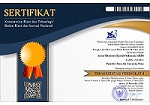The Efficiency of Zakat Collection and Distribution in Indonesia
Abstract
Keywords
Full Text:
PDFReferences
Ahmad, Ismail H.J., and Masturah Ma’in. 2014. “The Efficiency of Zakat Collection and Distribution: Evidence from Two Stage Analysis.” Journal of Economic Cooperation and Development 35(3): 133–70.
Akbar, Nasher. 2009. “Analisis Efisiensi Organisasi Pengelola Zakat Nasional Dengan Pendekatan Data Envelopment Analysis (DEA).” Islamic Finance & business Review 4(2): 760–84.
Al-Ayubi, Solahuddin, Ascarya Ascarya, and Bayu Taufiq Possumah. 2018. “Examining the Efficiency of Zakat Management: Indonesian Zakat Institutions Experiences.” International Journal of Zakat 3(1): 37–55.
Bauer, Talya N., Michael R. Dolen, Carl P. Maertz, and Michael A. Campion. 1998. “Longitudinal Assessment of Applicant Reactions to Employment Testing and Test Outcome Feedback.” Journal of Applied Psychology 83(6): 892–903.
Beik,I.S., Nursechafia, Muljawan, D., Yumanita, D., Fiona, A., Nazar, J.K. 2014. “Towards an Establishment of an Efficient and Sound Zakat System.” Working Group of Zakat Core Princples: 0–43.
Berber Philip, P. et al. 2011. “Efficiency in Fundraising and Distributions to Cause-Related Social Profit Enterprises.” Socio-Economic Planning Sciences 45(1): 1–9.
Charnes, A., W. W. Cooper, and E. Rhodes. 1978. “Measuring the Efficiency of Decision Making Units.” European Journal of Operational Research 2(6): 429–44.
Djaghballou, Chams Eddine, Mohamed Djaghballou, Mousa Larbani, and Azhar Mohamad. 2018. “Efficiency and Productivity Performance of Zakat Funds in Algeria.” International Journal of Islamic and Middle Eastern Finance and Management 11(3): 474–94.
Drake, L. 2001. “Efficiency and Productivity Change in UK Banking.” Applied Financial Economics 11(5): 557–71.
Hadad, Muliaman D, Santoso Wimboh, Dhaniel Ilyas, and Eugenia Mardanugraha. 2003. “Analisis Efisiensi Industri Perbankan BI.” Journal of Economics Literature. https://www.bi.go.id/id/publikasi/perbankan-dan-stabilitas/riset/Pages/Penggunaan Metode Nonparametrik Data Envelopment Analysis (DEA).aspx.
Jemric, Igor, and Boris Vujcic. 2002. “Efficiency of Banks in Croatia: A DEA Approach.” Comparative Economic Studies 44(2–3): 169–93.
Lovell, C. A. Knox, Shawna Grosskopf, and Rolf Fare. 2016. “The Structure of Technical Efficiency.” 85(2): 181–90.
Mohamad Soleh Nurzaman. 2010. “Zakat and Human Development : An Empirical Analysis on Poverty Alleviation in Jakarta , Indonesia 1.” 8th International Conference on Islamic Economics and Fnance: 1–26.
Mubtadi, Novendi Arkham, and Dewi Susilowati. 2018. “Analysis of Governance and Efficiency on Zakat Distribution: Evidence From Indonesia.” International Journal of Zakat 3(2): 1–15.
Parisi, Salman Al. 2017. “Tingkat Efisiensi Dan Produktivitas Lembaga Zakat Di Indonesia.” Esensi 7(1).
Prasetyo, Suseno Budi. 2008. “Analisis Efisiensi Distribusi Pemasaran Produk Dengan Metode Data Envelopment Analysis ( DEA ).” Jurnal Penelitian Ilmu Teknik 8(2): 120–28.
PUSKAS BAZNAS. 2017. The Concept of Zakatnomics. Jakarta: PUSKAS BAZNAS.
———. 2019a. FINANCIAL RATIO OF ZAKAT MANAGEMENT ORGANIZATIONS: THEORY AND CONCEPTS.
———. 2019b. OUTLOOK ZAKAT INDONESIA 2019.
———. 2020. OUTLOOK ZAKAT INDONESIA 2020.
Rusmini, and Seno Aji. 2019. “EFISIENSI KINERJA LEMBAGA AMIL ZAKAT DALAM MENGELOLA DANA ZIS DENGAN METODE DEA ( STUDI PADA YDSF SURABAYA ) Rusmini , Tony Seno Aji Ekonomi Islam , Fakultas Ekonomi , Universitas Negeri Surabaya Ekonomi Islam , Fakultas Ekonomi , Universitas Negeri Surab.” 6(2): 148–65.
Saad, Ram Al Jaffri, and Abubakar Umar Farouk. 2019. “A Comprehensive Review of Barriers to a Functional Zakat System in Nigeria: What Needs to Be Done?” International Journal of Ethics and Systems 35(1): 24–42.
Thanassoulis, Emmanuel, and Maria Conceição A. Silva. 2018. “Measuring Efficiency Through Data Envelopment Analysis.” Impact 2018(1): 37–41. https://doi.org/10.1080/2058802X.2018.1440814.
Vitaliano, D F et al. 1999. “What Is DEA? History of DEA from Its Developer, William W Cooper.” 17(1999): 1–9.
Wahab, Norazlina Abd, and Abdul Rahim Abdul Rahman. 2011. “A Framework to Analyse the Efficiency and Governance of Zakat Institutions.” Journal of Islamic Accounting and Business Research 2(1): 43–62.
Wahab, Norazlina Abd, and Abdul Rahim Abdul Rahman. 2012. “Productivity Growth of Zakat Institutions in Malaysia: An Application of Data Envelopment Analysis.” Studies in Economics and Finance 29(3): 197–210.
Wulandari, Retno. 2014. “Analisis Efisiensi Lembaga Zakat Nasional Di Indonesia Menggunakan Data Envelopment Analysis (DEA) Periode 2011-2012.” eprints.ums.
Yumanita, Diana, and Ascarya. 2006. “Analisis Efisiensi Perbankan Syariah Di Indonesia.” (December 2006).
Yusuf, Muhammad Bashir Owolabi, and Alias Mat Derus. 2013. “Measurement Model of Corporate Zakat Collection in Malaysia: A Test of Diffusion of Innovation Theory.” Humanomics 29(1): 61–74.
Zahra, Aulia, Prayogo P. Harto, and Ahmad Bisyri ASH. 2019. “Pengukuran Efisiensi Organisasi Pengelola Zakat Dengan Metode Data Envelopment Analysis.” Jurnal Akuntansi Dan Keuangan Islam 4(1): 25–44.
DOI: http://dx.doi.org/10.21927/jesi.2021.11(1).28-40

This work is licensed under a Creative Commons Attribution-ShareAlike 4.0 International License.












